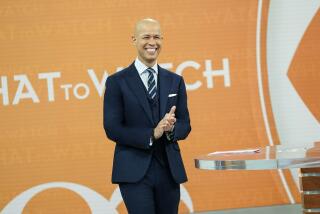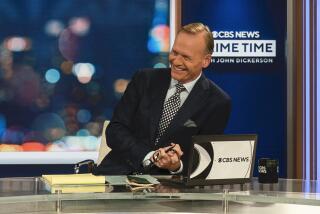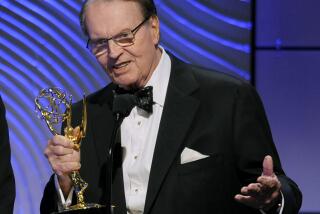His Personal News Slant
- Share via
Since 1971, Charles Osgood has offered up witty, acute and often poetic observations to radio and television audiences about his life, his family and the world in general. He does so as a news correspondent for CBS.
Osgood, who also sports dapper bow ties, writes and anchors “The Osgood File” four times daily for CBS Radio, co-anchors the “CBS Morning News” and does regular features on “CBS Evening News,” “CBS This Morning” and “Sunday Morning.”
Osgood talked to Susan King during a whirlwind visit to Los Angeles.
Is it true that with your busy schedule you actually live at CBS in New York?
I really don’t. I get up really early in the morning and I am there by four in the morning. I live in New Jersey and the only advantage of working those hours is there is no traffic in the morning. I do the “CBS Morning News” on TV and I do four radio shows. The broadcast of the “Morning News” on TV coincides with the first radio broadcast, so I have to write it and record the radio show before I go into the television studio.
Do you prefer radio to television?
To tell you the truth, I like radio better. Television is wonderful and I don’t mean to take anything away from it, but the fact is that a TV picture is very literally “what you see is what you get.”
I think everybody sees the same thing on the television screen, but if you have 12 million listening in on radio, and that’s the number they kick around as the audience for the “Osgood File,” then you get 12 million different pictures. You bring your own experience and emotions to radio that you don’t to television. I do think that radio is more visual. It’s a paradox but it’s true.
A lot of your pieces deal with your family life and other personal experiences. Do you also get inspiration from newspapers and magazines?
Even if I don’t do a piece about that day’s top breaking story, and usually I don’t, it’s important for me to know what that top story is so you are not talking in a vacuum. I am on news stations so people are aware of what is going on and I have to be aware of it, too. Other times I will take a breaking story, but instead of just giving all the facts of a breaking story, which is what you do on a newscast, I will look for some way of isolating a particular aspect of it and talking about it in a humorous way. I hate stories that are just all numbers.
Did you begin your professional radio career right out of college?
I went right to work for a classical musical station in Washington called WGMS. I was an announcer. I learned a lot doing that.
I was about to be drafted in the Army, this was 1954, and I ran into a guy while I was having dinner with a friend of mine and he was dressed in a white uniform, the most fancy uniform this side of the Ritz Hotel. It turned out he was the announcer for the United States Army Band. I asked him when he was getting out and he said within the next few weeks, so the next morning I was parked out at the commanding officer’s office. He was impressed with the fact I could pronounce Rimsky-Korsakov. That’s how I got the job.
More to Read
The biggest entertainment stories
Get our big stories about Hollywood, film, television, music, arts, culture and more right in your inbox as soon as they publish.
You may occasionally receive promotional content from the Los Angeles Times.










